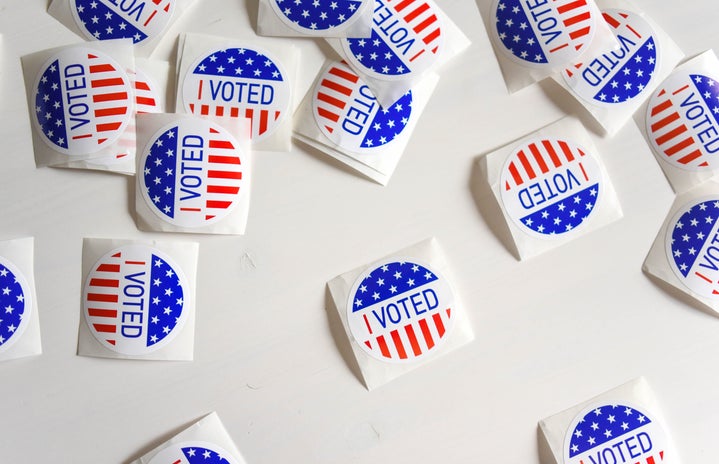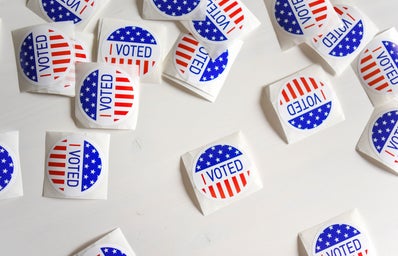As the primaries for the 2020 presidential race begin, the political climate of Kenyon seems to be kicking into high gear. While students walking down middle path are breaking out their Bernie t-shirts and Warren stickers, ten minutes down the road, politics are taking a much different shape. In the 2018 general elections, well over 60% of Knox County voters supported the Republican candidates in every position. The culture and life circumstances that inform the beliefs of most Knox County residents are markedly different from those of Kenyon students—so much so that it feels difficult at times to categorize Kenyon as an institution connected to Knox County, Ohio. Sure, that may be our location, but the life experiences and political values of the student body here often have very little to do with rural life. Nonetheless, as freshmen Claire Goldman and Sally Smith have found through canvassing in Mount Vernon and Gambier, creating a space for dialogue between the Kenyon student body and surrounding community enables a sense of mutual respect and understanding. Claire and Sally are from Georgia and Tennessee respectively, and explain that they are familiar with similar political climates. After enrolling at Kenyon last Fall, Sally was contacted by Elizabeth Warren’s office in Columbus, and she and Claire decided to volunteer to canvass for Warren.
Before moving to Gambier, both Claire and Sally had been active in local and national politics. Claire has volunteered with both the Warren and the Stacy Abrams campaigns in Georgia, and Sally was in charge of the Clinton campaign in her county in Tennessee, as well as being involved in numerous local campaigns. Last week I sat down with both of them to learn about their experiences canvassing for Elizabeth Warren in Knox County.
Tell me a little bit about your work canvassing—what does the job entail?
Sally: It’s the traditional knocking on doors, talking to voters. This is for the Elizabeth Warren primary in Ohio, so we’re only talking to Democrats at this point—or at least to the people the software thinks are Democrats. We’ve covered Mount Vernon and Gambier. It kind of depends on—this is a niche phrase—but it depends on the turf that we’re cut.
Claire: The computers tell us where to go, and they are not always Democrats. Generally [those who are not democrats] are very respectful! We’re showing people that we want to make an effort—even if they think it’s silly that we’re making an effort it still influences people.
Sally: Yeah, people are generally really nice. The worst we ever get is people saying things like “aw, so sweet!” in a condescending tone, which is not bad. It’s also a good way to get to know the community. Through canvassing I’ve learned just as much, if not more, from the people we’re talking to [than them from me].
Claire: It’s a really good way to get off the hill.
What is your strategy or goal when approaching someone’s door?
Sally: We have a script, but you slowly generate your own one based off of that.
Claire: We’re usually asking what issues people care about, for example, are there any issues in particular that you find especially significant this election? Are you really interested in health care? Do you really care about the economy? Do you really care about the environment? From there, we talk about what candidates they’re thinking about: do you have a few top choices? Are you settled on somebody? I think we’ve found that there are a significant amount of Warren supporters in this area. Bernie is also very popular, and a lot of people are happy to see either progressive candidate.
Claire: [When we begin talking to someone] we’re honest about the things we don’t know about, there’s no point in lying and it’s bad for the campaign—so we direct them to the website. But we often talk about things we personally care about; people like to talk about the things they’re passionate about, and that makes for a good conversation.
When you came to Kenyon, was volunteering as a political canvasser something you knew you wanted to do as freshmen?
Claire: I knew I wanted to work the campaign phase, but I wasn’t sure how. At that point [in the beginning of the year] I wasn’t settled on a candidate, but I knew I wanted to volunteer. I’ve always known I’ve wanted to work in politics somehow.
Sally: One of the main reasons I was excited to come to Ohio was for campaigning. I was thinking of getting involved after the primary was settled, just because I assumed there wouldn’t be opportunities, but part of Warren’s platform is that she wants to get rid of the electoral college, so she’s been sending staff to a lot of states. She was the first candidate to hire staff in Ohio, and she went to Tennessee and Mississippi very early, which is [rare].
How has canvassing in Mount Vernon and Gambier changed your Kenyon experience? Has it given you a connection to the wider community that you wouldn’t have had otherwise?
Claire: I think it’s important for kenyon students to connect more with people in mount vernon, and in the wider KC community. It does, at times, feel like kenyon is very isolated. And people don’t make the effort to talk to people [outside campus]. Not only is it better for us as individuals, but I think it’s better for the community and better for kenyon if we have stronger connections.
Sally: Kenyon students are from places where they feel like they don’t have to make the effort. I do find it somewhat more homey here haven spoken and gotten involved with the community. My home is generally similar politically, oftentimes I find I resonate more with the locals off campus, just because of my upbringing, than I do on the hill.
Has cavassing proven to be a positive or successful experience? What has been the overall community reception of your canvassing?
Sally: A lot of people just want to be heard. I think canvassing is important because we’re really learning from [Knox County citizens], about what they care about. We’re asking them questions. Before we say anything about why we believe what we believe, we ask them about their own beliefs.
Claire: Canvassing is more to hear what the community cares about, and even if people are initially turned off by whatever conceptions they have of us [as Kenyon students], the more you talk to someone, the harder it is to let a stereotype hold up. You just have to be aware of the differences in life experiences that people have, and be nice and respectful.
Sally: We’re also very aware, though, that we go to an insanely expensive school in an area that isn’t necessarily wealthy. People are always super nice—they want to see young people engaged. Even if they don’t agree, people are generally so welcoming. They’ll be receptive to us even if they aren’t receptive to our policies.
Claire: We almost never do more of the talking; it’s usually asking people what they want to discuss, and listening to them.
**Claire and Sally would like to make clear that they are volunteers; they are not speaking on behalf of the campaign, but sharing their own opinions.




